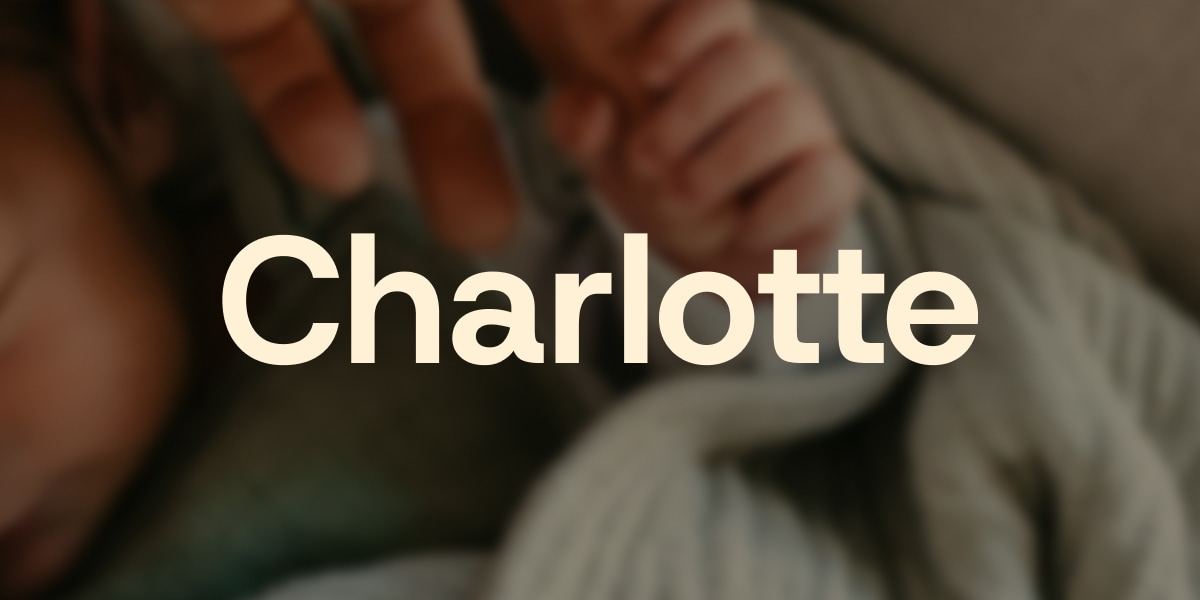
How to Choose the Perfect Name for Your Newborn Baby in 2025
Naming your newborn is a deeply personal and exciting decision, but it can also feel like a big responsibility.


Charlotte’s origins march through history. In Germanic tribes, "karl" signified a free, strong individual, a root of the masculine Charles. The feminine Charlotte emerged in medieval France, a diminutive that softened its might into grace — think Charlotte of Savoy, queen consort in the 15th century.
In England, Charlotte gained royal stature with Queen Charlotte (1744–1818), wife of George III, her intellect and charm inspiring cities like Charlotte, North Carolina. Though steady through time, it glowed quietly, awaiting rediscovery.
The name rose in the 19th century, as Victorian tastes prized its poise — think Charlotte Brontë’s Jane Eyre (1847). By the 2000s, Charlotte surged, lifted by legacy. Princess Charlotte (born 2015), daughter of Prince William, draped it in modern royalty, sparking its rise. This blend of strength and dignity turned Charlotte into a noble favorite.
Culturally, Charlotte shines across borders. In French, Charlène keeps its strong tie, a thread in tales — think "Charlotte douce" in songs. Nicknames like Lottie or Charlie add a tender snap, yet its meaning — "free man" — carries a mighty weight.
In Germanic lore, Charlotte echoes in tales of liberty, while in Spain, it pairs with "libre" (free) in naming trends. From Britain to Australia, Charlotte casts a universal spell, blending ancient valor with fresh appeal.
Famous Charlottes have enriched its legacy. Charlotte Perkins Gilman (1860–1935), the feminist writer of "The Yellow Wallpaper", ties it to bold thought. Charlotte Church (born 1986), the Welsh singer, links it to soaring talent. In fiction, Charlotte the spider from Charlotte’s Web (1952) by E.B. White, amplifies its wise vibe. These figures showcase Charlotte’s range—spanning intellect, art, and grace.
Today, Charlotte reigns high on name charts. In 2023, it ranked #3 for girls in the U.S. (per SSA.gov), up from #6 in 2010, reflecting its regal flair. In the U.K., it hit #24 in 2022 (ONS data). Parents adore its strong beauty and classic edge—a name that feels timeless yet new. Whether inspired by its Germanic roots, its royal echo, or its warm glow, Charlotte carries an enchanting presence. It stands like a crown, offering freedom and poise to those who wear it — a steady light in a vast realm.
Charlotte pairs beautifully with names that echo its regal charm or soften its sturdy glow. For siblings, consider James (supplanter) or Clara (bright) to keep the classic theme alive. Lighter picks like Ivy or Theo balance Charlotte’s firm stride. As a middle name, Charlotte shines in combinations like Ava Charlotte, where its rich syllables sing, or Rose Charlotte, blending flower and strength. In 2023, U.S. parents loved Charlotte Grace and Charlotte Marie (per SSA trends), merging timeless virtue with regal mystique. Whether leading or following, Charlotte’s versatility lights up any duo.
For a quirky duo, try Charlotte and Chase — free siblings ruling the family tree.
Charlotte’s variations add subtle twists. In French, Carlotta keeps the strong tie, while Lotte (German) shortens it with a sprightly lilt. Charlize, a modern spin, evokes a sleek flair, and Carolina nods to its broader roots. These variants highlight Charlotte’s adaptability, from classic to creative.
Love Charlotte’s noble vibe? Try Caroline (free) or Eleanor (light) for more stately charm.


Naming your newborn is a deeply personal and exciting decision, but it can also feel like a big responsibility.

Discover the top 20 boys’ names starting with A in 2025 — Asher, Alexander, August & more — with meanings, trends, and why they’re popular.